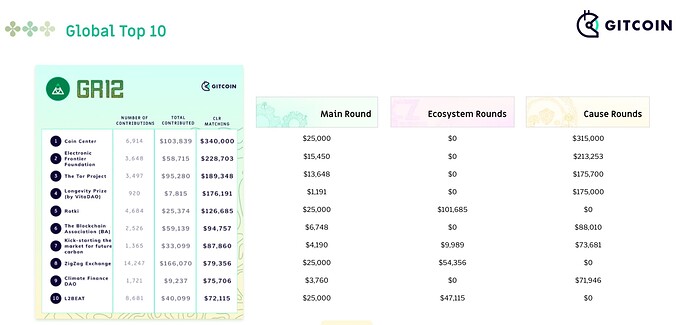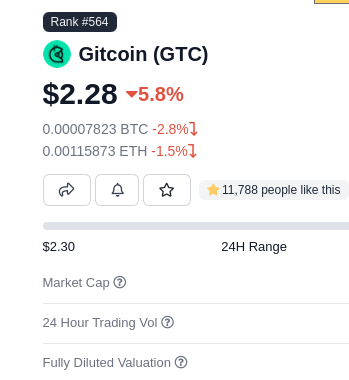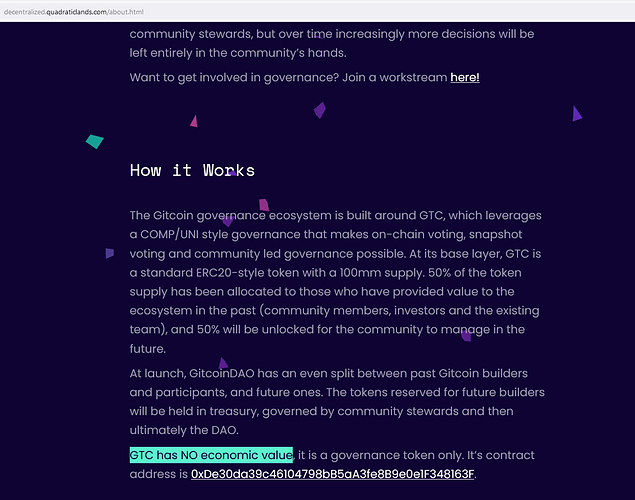Summary
This proposal looks to finalize round structure & matching pool allocations for Grants Round 14.
In addition, we’re proposing a policy change to platform-level eligibility for grantees, following the many discussions on this topic in GR13.
TLDR:
-
GR14 will look similar structurally to GR13, as we hone our innovation focus in on Grants 2.0 and launching the protocol
-
We are standing up a dedicated ETH Infra round in order to more intentionally support Ethereum protocol development
-
We are proposing removing the “grants should not have a token” criteria from platform eligibility
Round Structure
GR13 Recap
Main Round
In GR13, we continued on with the no-category approach & the 2.5% main pool matching cap that we had successfully tested in GR12.
As background, prior to GR12, the main pool was divided into categories that assigned pre-set percentages of the pool to grants in specific disciplines or geographies (“categories”).
Since then, we have done away with that category-based main pool approach, and instead have been scaling thematic matching pools outwardly with Ecosystem & Cause Rounds, which are dedicated QF pools for specific projects & domains. See the GR13 & GR12 posts for more context.
Based on community feedback, the no-category approach and 2.5% matching cap continued to satisfy their intent and people are excited by the benefits that cap continues to bring to the longer-tail of grantees (funding many grants vs. letting the top few take the lion’s share of the pool).
Ecosystem Rounds
Based on ecosystem partner feedback, Ecosystem Rounds – rather than main pool categories – are an offering that there is a clear market need for us to continue with & build upon.
We’ve grown Ecosystem Rounds substantially – from 2 in GR11, to 5 in GR12, to 9 in GR13 – and are seeing demand in GR14 from ecosystems that are new to working with Gitcoin, a testament to product-market fit of that offering in spite of market turmoil. We ran retrospectives with several partners after GR13 to get their input as we build these out further.
As we work towards giving ecosystems more agency over their own rounds, we are seeing some awesome community-led innovation take shape. A few examples to note from GR13:
-
Collaborative ecosystem rounds, like ZK Tech & Open Gaming
-
Novel funding mechanisms, like Radicle’s Drips
-
Ecosystem round matching caps: In GR13, we offered the option for these rounds to set their own individual matching caps. All nine rounds took us up on this offer, selecting caps ranging from 10-20%, allowing ecosystems themselves to test QF based on their own needs
As we look towards Grants 2.0, a world wherein anyone will be able to stand up their own grants program, we want to continue to enable ecosystems to successfully run & innovate on their own rounds on top of Gitcoin, rather than Gitcoin doing this work in a centralized way.
Cause Rounds
Cause Rounds are rounds funded by external sponsors for clear sets of global public goods, and represent Gitcoin moving beyond just Web3 & Digital Public Goods, and into Public Goods more broadly speaking. These rounds expand the user base & TAM of Gitcoin Grants, and have successfully brought in funding interest from major Web2 philanthropists.
In GR13, in addition to continuing with the Climate & Longevity rounds from GR12, we added a ‘Support for Ukraine’ round. This round was successful by all accounts, raising $700K in matching funds in the span of just a couple weeks to provide humanitarian aid given the crisis in Ukraine.
All this said, we continued to learn acutely in GR13 that Cause Rounds represent a lot of operational overhead for Gitcoin – since there isn’t usually an external lead driving these rounds forward like we have with Ecosystem Rounds, a substantial lift falls on the PGF workstream for these rounds.
As a result, until we have the Grants 2.0 protocol which will enable anyone, anywhere to stand up their own Cause Round, we plan to grow these rounds vertically, rather than horizontally (i.e., doubling down on just a few key rounds and scaling funding within those rounds). We don’t have the resources to run many small Cause Rounds in parallel.
GR14 Proposal
We propose GR14 look a lot like GR13 – partly because the community feedback we have received on the direction of the last couple rounds is positive, and partly because we are honing our innovation focus in on Grants 2.0 and launching the protocol.
Context: Grants 2.0 & Maintenance Mode
To be explicit about the second point above: Grants 1.0, the centralized platform on which our program currently runs, is now in maintenance mode. The product team will fix any bugs and continue to maintain the platform as we build Grants 2.0 in parallel, but no product resources are prioritized to innovate on the current platform.
This limits how much we can play with the grants program in the near-term, but is the right long-term direction given the vision we are working towards.
Given the above context, we do not plan to make substantial changes to the grants program structure or do any substantial innovation on QF over the next few rounds, with an eye to this longer-term big play we are marching towards.
Proposed Round Structure
As a result, the Public Goods Funding workstream proposes that the structure of the round remains the same for GR14 at a high-level.
In summary, the structure of the round will remain:
- A Main Pool (of up to $1M)
- Ecosystem Rounds
- Cause Rounds
Main Pool
The GR14 main pool will be a single matching pool fund/distribution of up to $1M in matching for the round. As in GR13, no individual grant’s matching contribution amount shall exceed 2.5% of the overall matching pool fund.
We are specifically requesting “up to $1M”, rather than a specific amount.
This “up to $X” is something we’ve been discussing for a bit – while historically we’ve requested a specific amount, we actually don’t think it makes sense for governance to ratify a specific amount prior to the round. Doing so prematurely and setting too high an amount can cause us to unnecessarily pull funds from the multisig – since when these posts are created, we are still fundraising for the main round. This is especially timely right now given the down market, and the fact that we have seen some funders rescind commitments due to that.
Ecosystem Rounds
In GR14, we plan to run roughly ten Ecosystem Rounds. As in previous rounds, these are pass-through funds that are not drawn from the existing multisig balance, and once again we have a mix of new & returning ecosystem partners funding these rounds.
Within the ecosystem rounds we plan to run in GR14, we are particularly excited to announce a new Ecosystem Round we are being intentional about standing up: an ETH Infra round focused on protocol devs in the Ethereum ecosystem.
This round was spun up in response to the discussion here – and as we expand Gitcoin Grants beyond just open-source in the Ethereum ecosystem, we believe this is an important round to prioritize in order to ensure we are continuing to have a dedicated funding pool for protocol development.
Cause Rounds
In GR14, we plan to run three Cause Rounds: a Climate Round, a Blockchain Advocacy round, and a new DEI Round. As with Ecosystem Rounds, these are pass-through funds that are not drawn from the existing multisig balance.
Grants Eligibility Update
We are proposing an expansion to grants eligibility in GR14, based on (1) the direction we are headed with Grants 2.0, and (2) the BrightID appeal which brought into question the existing eligibility criteria.
Context
Since its inception, Gitcoin has been focused on funding public goods. In the early days of the grants program, there were no eligibility criteria highlighting ‘what’s in’ and ‘what’s out’ – anyone could get approved for a Gitcoin Grant. At one point, it was brought to Gitcoin’s attention that there were grants on the platform that did not meet the ethos of ‘public good’, and the following norms were established for grants eligibility:
-
A grant should not have raised over $500K in VC funding
-
A grant should not have a token
Today, FDD declines grant applications that meet these criteria. In addition, community members have the ability to ‘flag’ a grant they see on the platform that they believe should not be deemed a public good, which then sends that grant to FDD’s dispute process. Denied grants are offered a chance to request an appeal which are vetted by the FDD. The ideal process by which appeals might trigger policy revisions (and vice versa) have not yet been established. FDD has consultations with LexDAO Impact Clinic planned.
Where we are today
As outlined in this post, the landscape has evolved and many early-stage projects, like BrightID, that the community would deem eligible for grants do have small token experiments.
In GR13, as we pursued the BrightID appeal, we explored the idea of allowing tokens under a certain market cap. We realized quickly that there is a ton of complexity associated with this – token reporting is non-standard, and setting a market cap would be too arbitrary a criteria that would likely continue to require much manual review.
Recommendation
PGF & FDD are recommending that we remove the ‘a grant should not have a token’ criteria from our eligibility.
As per the existing rules, the removal of this criteria does not mean that airdrops and quid pro quo offers will get through, only that the existence of a token doesn’t automatically disqualify a project. QPQ also applies to/includes non-monetary rewards.
As with the BrightID appeal, we want to move in the direction of putting the definition of a public good into the community’s hands, rather than having this be something Gitcoin prescribes centrally. As the result of that specific appeal makes evident, the ‘has a token’ criteria is not a good barometer of what the community considers a public good – and so we propose broadening the aperture, and triaging appeals on a case-by-case basis.
In addition, we will work with the product team to determine what changes we might make in assessing whether a project is a public good at application stage (e.g., requiring projects with a token to submit a brief writeup on why they should be eligible).
Grants previously turned down for having tokens will need to re-apply and will not automatically be re-reviewed with this change.
Voting Options
We will ask the stewards to vote on three options:
Option 1: FOR GR14 Structure & FOR New Eligibility
You approve the GR14 structure as is, and are in favour of us removing the “no token” eligibility requirement.
Option 2: FOR GR14 Structure & AGAINST New Eligibility
You approve the GR14 structure as is, but are NOT in favour of us removing the “no token” eligibility requirement. If this option prevails, GR14 eligibility will remains as-is.
Option 3: AGAINST GR14 Structure
You do not approve of the GR14 structure, and will be submitting an alternate proposal for consideration.
Once we have feedback on both this and any other proposals, the Public Goods Funding workstream will gather all formal proposals and submit a Snapshot vote to decide which to move forward with.
Please do not submit a snapshot vote for your proposal specifically! This just adds confusion and makes it harder for the community’s voice to be heard effectively.


